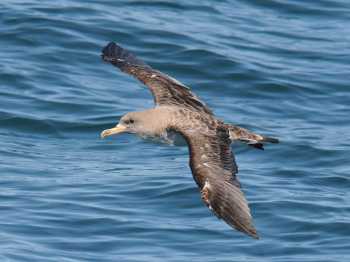ACAP Latest News reports on a PhD opportunity with Cory's Shearwaters Calonectris borealis (Least Concern), working at the Unversity of Barcelona in Spain.

Cory's Shearwater at sea, photograph by John Graham
“We are seeking for a dedicated, highly-motivated and enthusiastic predoctoral fellow to develop her/his doctoral thesis at Marta Riutort’s Lab (@RiutortLab) in the Universitat de Barcelona in collaboration with Jacob González-Solís' lab in a project entitled The Genetic Basis of Seabird Movement.
What is our project?
Shearwaters are a uniquely pelagic group of seabird species that have adapted over the past ~15 million years to the relatively uniform ocean environment in a diversity of ways. They are ocean wanderers that exhibit strikingly different scales and patterns of migratory and foraging movements. A significant proportion of the phenotypic variance in migratory traits is genetic and has high heritabilities, but the genes involved in shaping these phenotypes are still largely unknown and we know even less about the genetic basis of foraging strategies. Over the last 15 years, we have gathered a database of hundreds of tracks deploying geolocation-based and GPS loggers on Cory’s shearwaters at several breeding colonies. Several characteristics of the tracks show remarkable repeatabilities suggesting a genetic control of some aspects of the migratory and foraging behaviour. Using NGS methodologies and our knowledge on the phenology of these movement s we expect to be able to characterize their genetic bases.
To do what?
The successful candidate will carry out fieldwork at a Cory’s shearwater colony in the Canary Islands to increase the tracking database on related individuals and will also work in the wet lab preparing DNA extractions for Next-generation sequencing (NGS). Last, but not least, she/he will perform quantitative genetics analyses and will map migratory and/or foraging phenotypes to the genotypes. The candidate will have the opportunity to collaborate with researchers within and outside our research group.
Who?
The prospective candidates must hold a Master degree in Biology or similar scientific area and must have a Bachelor’s (Grado) grade higher than 8/10 (Spanish system) in order to compete for a PhD fellowship (FI from Generalitat de Catalunya, FPU from Ministerio de Educación y Formación Profesional or APIF from Universitat de Barcelona).
Preference will be given to candidates with:
Previous experience in DNA extraction
Knowledge of Linux computer systems
Basic knowledge of the R and/or Python environments
Basic knowledge of NGS sequencing and bioinformatics
For further information and expressions of interest, please contact
John Cooper, ACAP Information Officer, 13 August 2018

 English
English  Français
Français  Español
Español